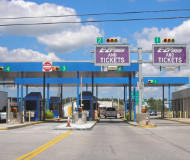12/20/2019
Groups Ask US Supreme Court To Weigh In On Toll GougingTrucking and motorist groups petition US Supreme Court to overturn decision allowing toll roads to charge unlimited amounts for transit projects.

Drivers of trucks and automobiles are asking the US Supreme Court to do something about the excessive tolls being charged on the Pennsylvania Turnpike. The Owner Operator Independent Drivers Association (OOIDA) and National Motorists Association (NMA) last week petitioned the high court's nine justices to overturn the Third Circuit US Court of Appeals ruling that endorsed the collection of tolls to fund projects wholly unrelated to the use of the road (view ruling).
The groups argue that the "dormant" Commerce Clause prohibits states from interfering with interstate commerce by imposing undue burdens on businesses located out of state. The turnpike does this by imposing the highest rates on big rig trucks. They also argued that imposing tolls greater than the amount needed for road upkeep burdens motorists' right to travel.
"In 2007, Pennsylvania enacted a statutory scheme that converted the Pennsylvania Turnpike into a source of revenue to fund myriad projects throughout the state that have no functional relationship to the Turnpike," attorneys Kevin J. McKeon and Paul D. Cullen wrote in their petition to the court.
Charges on Pennsylvania's toll roads are generally triple what they need to be in order to generate $450 million in annual profit that, under state law, must be transferred to the Pennsylvania Department of Transportation (PennDOT) to pay for transit projects.
"Never in the history of the United States has Congress or a court concluded that user fees of this magnitude are constitutionally appropriate," Cullen and McKeon wrote. "The Third Circuit's decision sanctions these excessive tolls and permits states to charge unlimited tolls on federal-aid highways in violation of the dormant Commerce Clause and the constitutional right to travel."
The US Supreme Court only takes on a small number of cases brought before it each year. The drivers organizations cite the inconsistency between the Third Circuit ruling and other appellate courts (the First, Fourth, Fifth and Ninth) as a compelling reason for the high court to weigh in and clarify with a binding interpretation of the law.


